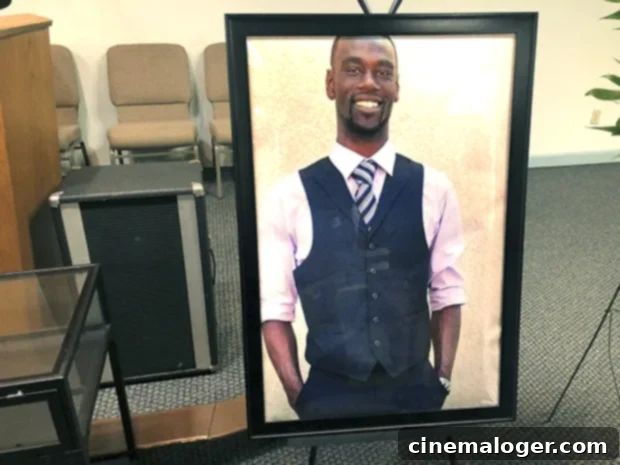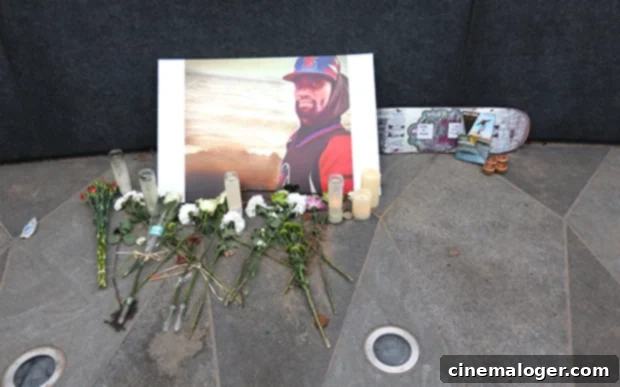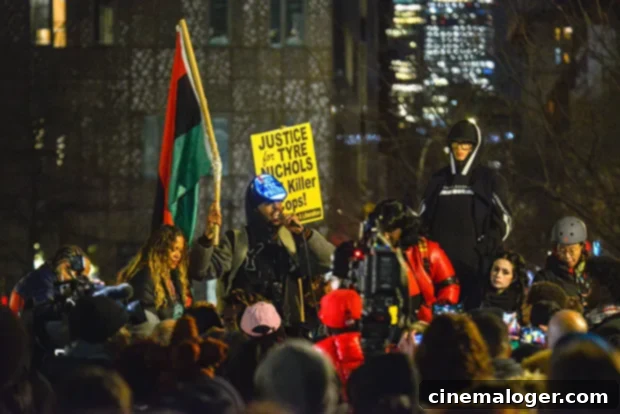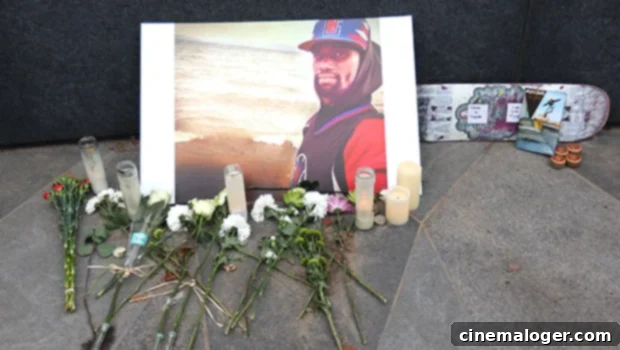Tyre Nichols’ Funeral: A Powerful Call for Justice and Systemic Police Reform
The nation gathered in profound sorrow and renewed determination on Wednesday, February 1, as Tyre Nichols, a vibrant 29-year-old father, son, and skateboarder, was laid to rest. His tragic death on January 10, just three days after a brutal beating by Memphis police officers during a routine traffic stop on January 7, ignited a fresh wave of outrage and grief across America. The funeral served not only as a poignant memorial for Tyre but also as a powerful platform for civil rights leaders, family members, and community advocates to reiterate urgent demands for police accountability and systemic reform.
The circumstances surrounding Tyre Nichols’ death have sent shockwaves through the country, prompting widespread protests, intense scrutiny of law enforcement practices, and a renewed national dialogue on racial justice. The incident gained widespread attention following the release of harrowing body camera and surveillance footage, which depicted officers repeatedly punching and kicking Nichols for several minutes. This brutal display of force led to his hospitalization in critical condition and, ultimately, his death from extensive injuries.

In an unusually swift and decisive response, five of the Memphis police officers directly involved in the beating were fired and subsequently arrested on multiple serious charges, including aggravated assault, aggravated kidnapping, official misconduct, official oppression, and second-degree murder. A sixth officer was also placed on administrative leave, with investigations ongoing into their specific role in the tragic incident, as reported by The New York Times. This rapid action, while a measure of accountability, underscores the severe nature of the abuses captured on video and the immense pressure from the public and civil rights organizations.
Tyre’s funeral was more than a private ceremony; it became a focal point for collective mourning and a global outcry for change, drawing national media attention and prominent figures committed to the cause of justice. It represented a crucial moment for reflection on the value of Black lives and the persistent struggle against police brutality in America. His family, deeply grieving, channeled their sorrow into an impassioned plea for meaningful reform, ensuring Tyre’s legacy would be intertwined with the fight for a more just and equitable society.
When and Where Was Tyre Nichols’ Funeral Held?
Tyre Nichols’ funeral services were held at the Mississippi Boulevard Christian Church in Memphis, Tennessee, on Wednesday, February 1, at 10:30 a.m. CST. The choice of this historic church as the venue resonated deeply within the community, as it has long served as a spiritual and social anchor for civil rights activism in Memphis.
The church had already played a significant role in the community’s response to Tyre’s death. Just days before the funeral, on Sunday, January 29, the church held a powerful service titled “Tyre Deserves Answers.” During this service, Pastor Dr. J. Lawrence Turner paid a moving tribute to Tyre Nichols, emphasizing the need for comprehensive police reform. “We want his family to know he will not be forgotten, and the fight is not over,” Pastor Turner declared, echoing the sentiments of many who gathered. He further stressed, “We also want to start what is going to be a movement to finally bring police reform to our country.” This preliminary service set a powerful tone for the funeral, transforming it from a mere burial into a rally cry for change.
The timing of the funeral, nearly a month after the tragic incident, allowed for a period of national mourning and reflection, culminating in a highly anticipated event that drew extensive coverage. The services were open to the public, and many across the country watched via live streams, further amplifying the calls for justice and accountability that emanated from Memphis. The solemn occasion was a stark reminder of the human cost of police violence and the enduring struggle for civil rights in the United States.

Who Attended and Spoke at Tyre Nichols’ Funeral?
The funeral for Tyre Nichols was a high-profile event that drew a host of distinguished guests, reflecting the national significance of his death and the widespread calls for justice. Beyond his grieving family and loved ones, numerous public officials, civil rights leaders, and activists were in attendance, transforming the service into a powerful platform for advocacy.

A pivotal moment of the service was the eulogy delivered by renowned civil rights activist Reverend Al Sharpton. Rev. Sharpton, a prominent voice against racial injustice and police brutality for decades, has a history of delivering powerful eulogies at the funerals of victims whose deaths have galvanized the civil rights movement, including George Floyd’s funeral. His presence and impassioned words underscored the continuity of the struggle and the pressing need for legislative action and cultural shifts within law enforcement. Sharpton’s message often combines calls for accountability with demands for comprehensive reform, resonating with a national audience.
Another powerful voice at the service was civil rights attorney Ben Crump, who represents Tyre Nichols’ parents. Crump has become a leading figure in the fight against police misconduct, representing the families of numerous Black Americans who have died at the hands of law enforcement. His address at the funeral served to not only honor Tyre’s life but also to reiterate the legal and moral imperatives for justice, transparency, and an end to systemic racism in policing. Crump’s speeches often blend legal strategy with emotional appeals, highlighting the personal tragedies behind the headlines.
Tyre’s mother, RowVaughn Wells, and stepfather, Rodney Wells, were at the heart of the service, sharing their profound grief and unwavering demand for justice for their son. Their strength and composure in the face of unspeakable tragedy have galvanized public support. Earlier, they had paid a heartfelt tribute to Tyre during an appearance on The View on Monday, January 30. RowVaughn spoke movingly about her son’s character, painting a picture of a loving, caring individual. “Tyre was a beautiful soul. Tyre, he loved his son. He loved his family. He loved his mother. He was just a beautiful person. Everyone that he came across, he touched in a positive way,” she shared, her words bringing a deeply personal dimension to the national conversation.
The Wells family’s courage and commitment to reform have not gone unnoticed at the highest levels of government. In a significant gesture of national solidarity and recognition, President Joe Biden extended an invitation for RowVaughn and Rodney Wells to attend the State of the Union address on Tuesday, February 7. This invitation underscored the administration’s acknowledgment of the profound impact of Tyre’s death and the urgency of addressing police accountability at a federal level. Their presence at such a pivotal national address was expected to serve as a powerful visual reminder to lawmakers of the human toll of police misconduct and the ongoing demand for legislative action, such as the George Floyd Justice in Policing Act.
The Broader Impact: Calls for Police Reform and Accountability
Tyre Nichols’ death has reignited national discussions on police accountability, the use of force, and the need for comprehensive systemic reforms. The swiftness with which the officers were charged marked a notable departure from many past cases of police brutality, yet advocates argue that true justice requires more than just individual prosecutions; it demands fundamental changes to policing culture and policies.
The tragedy has amplified calls for several key reforms, including increased transparency in law enforcement, particularly through the mandatory use and immediate release of body camera footage. Activists are also pushing for stricter national standards on the use of force, de-escalation training, and an end to qualified immunity for officers, which often shields them from civil lawsuits. The disbanding of specialized police units, like the SCORPION unit in Memphis to which the involved officers belonged, has also become a focal point of these demands, as such units are frequently criticized for their aggressive tactics and disproportionate impact on minority communities.
Community leaders and civil rights organizations continue to emphasize that Tyre Nichols’ legacy must be one of transformative change. His funeral, therefore, was not merely an event of mourning but a catalyst for sustained activism, bringing together diverse voices united in the belief that no family should endure such a preventable loss. As the nation reflects on Tyre Nichols’ life and the circumstances of his death, the collective hope is that this moment will finally usher in the meaningful reforms necessary to prevent similar tragedies and build trust between law enforcement and the communities they are sworn to protect.
